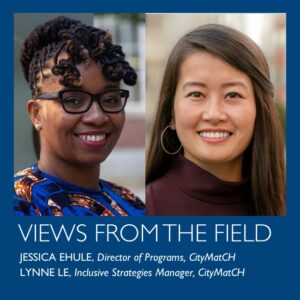Jessica Ehule, Director of Programs, CityMatCH
Lynne Le, Inclusive Strategies Manager, CityMatCH
CityMatCH is a national membership organization of city and county health departments’ maternal and child health (MCH) programs and leaders. We work with local representatives to address disparities in MCH outcomes; build their capacity; and support them in the development of equitable policies, programs, and procedures. We do this through several offerings including leadership training, a national annual conference, and learning collaboratives.
With a local focus, we can develop solutions that are uniquely created to address the root causes of disparities in a community. CityMatCH is committed to the achievement of health equity, and we recognize that a focus on racial equity and an active stance against racism must be prioritized. The health disparities we witness today are the results of centuries of oppression and discriminatory practices that have left a legacy of harm in communities of color. The combination of a local focus and racial equity approach is key to achieving equity in health outcomes for our nation. One of our current learning collaboratives was created with this core belief in mind.
The Racial Healing Revival (RHR) project is a CityMatCH learning collaborative that was inspired by a previous CityMatCH initiative called Racial Healing. It began as a self-funded idea among CityMatCH staff members in response to an apparent need to take a different approach, such as addressing systems, to achieve equity in health outcomes. Later, funding from the W.K. Kellogg Foundation was secured through CityMatCH’s BEST Cities initiative which includes other projects, including the Best Babies Zone and the Institute for Equity in Birth Outcomes, that hold similar goals of achieving equitable outcomes. However, unlike the other projects, RHR does not have a focus on a specific health outcome. The focus is on organizational change, which will have ripple effects in a variety of policies, practices, and outcomes seen in the community. There are currently three local health departments involved in the RHR project: Minneapolis, Minnesota; Nashville, Tennessee; and Omaha, Nebraska. The RHR teams have been tasked with collecting oral histories from their community and using these histories to develop and implement transformative changes in the policies, practices, and procedures of their health department. CityMatCH acts as a technical assistance partner and provides training and resources as needed for each team, but the local health department is leading the work in each community.
The two main components of the RHR, oral histories and internal change, have been concurrently implemented by the health department teams. The bulk of their time has been spent on building relationships within the community and with partner organizations. Because this cohort also overlapped with the COVID-19 pandemic, which consumed health departments’ time and resources, RHR teams required the partnership of other organizations to move the work forward. One team recruited the help of a local university to capture and analyze oral histories, and another team contracted with local historians. Without these key partnerships and relationships, progress would have been further delayed throughout the pandemic.
Teams have also worked to build internal capacity on equity. This has looked different for each team, based on the capacity of their unit or department. For instance, some of Omaha’s internal work has focused on hiring practices, such as incorporating equity within interview questions or removing certain qualification requirements. The Omaha team has also incorporated their RHR work into the county’s declaration of racism as a public health crisis. The team secured additional funding to build the community’s awareness of historical racism and its impacts on contemporary health outcomes, such as the impact of disinvestment and inadequate access to care seen in previously redlined neighborhoods. They host community panels and workshops, engage key stakeholders and champions, and have created an office dedicated to health equity within the health department to ensure the incorporation of racial equity internally and externally.
As an MCH organization, we often discuss inequities in birth outcomes such as infant mortality, maternal mortality, and low birth weight. However, by design, the RHR project addresses health outcomes by encouraging internal organizational and operational changes that will, in the end, promote systems changes within the communities and improve health outcomes. RHR promotes collaboration between a governmental entity, community organizations, and the people they serve by understanding the historical context of the current reality, acknowledging harm, building a foundation of honesty and trust, and creating opportunities for actively building a new culture together.
In this new era of public health care and practice, as our global community continues to endure the impact of a pandemic, we have a unique opportunity and responsibility to ensure we do not fall back into old patterns. This is our chance as a larger health-focused collective to use our expertise, influence, and resources to change the landscape of health. Governmental agencies, nonprofits, clinical and nonclinical groups, and funders have an important role in the future of public health.
As philanthropy considers future contributions to the field of public health, we suggest asking these questions:
- How have we intentionally included community voice and the community’s expertise?
- Are our efforts centering locally focused opportunities?
- How is this effort different from what we’ve done before?
- What opportunities are we missing to intentionally partner with people and organizations?
- How have we intentionally or unintentionally caused harm to communities of color? How do we rectify these?
For far too long we have witnessed lasting disparities in health outcomes across the United States, with communities of color often faring worse than white people. This is a legacy of harm that is due to societal factors and systems that have been baked into how we operate as a nation. It is time to take an intentional and transformative approach to undo these harms and reach racial equity. This is what we hope to contribute to the field through the RHR project.

